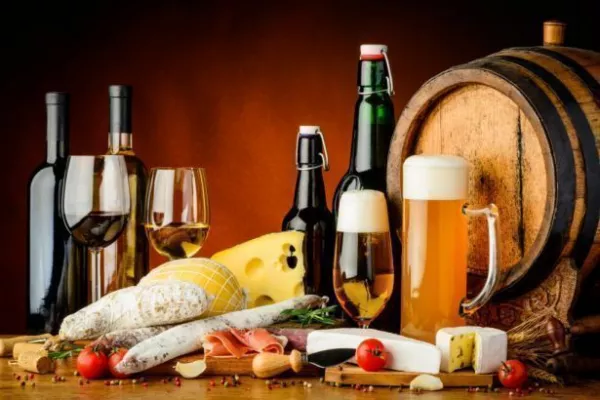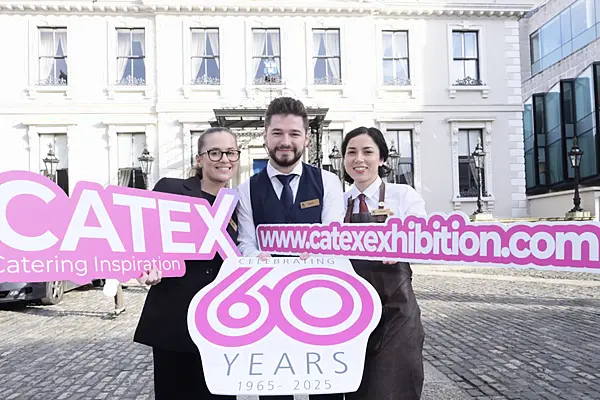Hospitality Ireland presents a round-up of global food, drinks and pub news.
Turkey's Getir Signs Deal To Buy UK Fast Delivery Company Weezy
Turkish fast grocery delivery company Getir has signed a deal to buy British rival Weezy, Getir said on Tuesday November 23, the latest move in a sector seeing a wave of consolidation.
Getir currently operates in several west European countries, as well as the United States and has been promoting its brand heavily across London. Financial terms for the deal were not disclosed.
The pandemic has fuelled demand for food and grocery delivery businesses but many of them are still losing money as they seek to build market share, fuelling deals.
In the most recent, U.S. company DoorDash Inc said this month it would buy Finland-based rival Wolt Enterprises OY in an all-stock deal valued at approximately €7 billion as it expands into Europe.
Getir attracted around $1 billion in three back-to-back funding rounds this year, putting its valuation at more than $7.5 billion.
French Caterer Elior Sets New Targets Driven By COVID-19 Recovery
French catering company Elior Group set on Wednesday November 24 its first financial targets since coronavirus-linked closures of schools and restaurants hit the service sector, as a gradual reopening helped its businesses recover.
Its shares jumped nearly 10% before paring the gains to trade 2% as CEO Philippe Guillemot later cautioned that a return to remote working would hit future revenue and call into question Elior's objectives for the next financial year.
He added that some of Elior's clients were "seriously considering" having people work from home two or three times a week as Europe faces a new wave of the COVID-19 pandemic.
Caterers had been starting to benefit from a return to schools and offices but now face new potential restrictions in Europe which is facing a surge in COVID-19 infections.
The group, which supplies businesses, schools, prisons, hospitals and care homes, is targeting an EBITA (earnings before interest, taxes and amortisation) margin of 2-2.5% next year and around 4.6% by 2024.
Analysts cheered the better-than-expected results and high hopes for the mid-term though some noted that its guidance was less impressive than its rivals like Sodexo and Britain's Compass.
Sodexo said last month it expected organic growth between 15% and 18%, as well as an operating margin of close to 5% at constant rates for its 2022 fiscal year while Compass forecast underlying operating margin of more than 6%.
"Though this (Elior's guidance) is weaker than peers', their targets for 2024 are ambitious, way ahead of consensus and pre-COVID levels," Bernstein analysts said in a note.
Elior expects its revenue to grow by at least 18% next year and at least 7% annually from 2022 to 2024. Fourth-quarter revenue recovered to 85% of pre-pandemic levels, it said.
The company improved its customer retention rate to 91.4% at the end of September from 91.3% during the summer, but this was still lower than 91.8% a year earlier.
Elior aims to improve this to 95% by 2024, but Guillemot warned this could be pushed back if the pandemic worsens.
UK Risks Christmas Alcohol Shortage Due To Lack Of Drivers
Britain could face a shortage of alcohol this Christmas unless the government steps up its efforts to address a lack of heavy goods vehicle (HGV) drivers, the wine and spirits industry warned on Wednesday November 24.
The prospect of limited alcohol lines follows panic buying at Britain's fuel pumps, soaring heating prices and shortages of items ranging from consumer electronics to crisps and vegan sausage rolls.
The Wine and Spirit Trade Association (WSTA) said 49 businesses including Moët Hennessy UK, Laurent-Perrier UK, Pernod Ricard UK, C&C Group and Matthew Clark, had put their names to a letter to transport minister Grant Shapps calling on him to take urgent action over HGV driver shortages and freight disruption.
"There is mounting concern amongst our membership that unless urgent action is taken, we will fall deeper into delivery chaos," said WSTA CEO Miles Beale.
"We are already seeing major delays on wine and spirit delivery times which is pushing up costs and limiting the range of products available to UK consumers."
The WSTA said its members had reported that importing products was taking up to five times longer than it did a year ago, with businesses that had previously been able to fulfil orders in two to three days experiencing shipments taking 15 days to process.
It also noted that freight costs had increased by 7%, as delivery firms have had to increase HGV drivers' wages to retain them.
The WSTA wants Shapps to extend a temporary visa scheme for HGV drivers from Feb. 28, 2022, to a minimum of one year, to ease the burden on industry and allow for a sufficient increase in domestic drivers.
It also wants his department to facilitate better routing of freight from ports and smaller UK-based driver networks for short-haul journeys.
The UK government said it did not expect disruptions to the supply of alcohol this Christmas, however.
“The government acted quickly to tackle the challenges to our supply chains, which were brought on by global pressures including the pandemic and the international shortage of HGV drivers," said a government spokesperson, noting 32 steps taken to tackle the shortage.
Britain's two biggest supermarket groups, Tesco and Sainsbury's, are currently running big wine promotions, indicating no immediate threat to wine supplies.
Pub Group Mitchells & Butlers Signals Cost Concerns As Sales Recover
British pub and restaurant company Mitchells & Butlers said on Thursday November 25 its sales in recent weeks have been higher than before the coronavirus pandemic but warned of challenges ahead due to rising costs for staff and utilities.
Announcing a jump in full-year operating profit to £81 million from £8 million last year, the owner of the O'Neill's, Harvester and All Bar One brands said Brexit had compounded risks around the supply and cost of products as well as labour shortages.
In the eight weeks since the end of its financial year on Sept. 30, however, it said sales had climbed 2.7% on a like-for-like basis to surpass levels before the pandemic thanks to pent-up demand and lower taxes on some alcohol.
The company's shares, which have lagged the broader FTSE 250 midcap index so far this year, jumped as much as 8% in early trading on Thursday November 25 before slipping back for a gain of 1.4%.
"Demand for our well-loved brands has been demonstrated by an encouraging return to sustained like-for-like sales growth since restrictions have been lifted, and we are confident in our ability to continue our recovery as a market-leading operator," Chief Executive Phil Urban said.
The company said its pretax loss for the year narrowed to £42 million from £123 million.
It said it was factoring in lower operating margins in the current financial year compared to pre-pandemic levels, with notable cost inflation across food, utilities and labour.
The company, which employs 44,000 people in its 1,700 restaurants and pubs, said it was buying ahead to sidestep the potential lack of availability of products while reviewing and updating key contracts with its suppliers.
UK Crisp Shortage Eases After Earlier Supply Problems
Fewer shops in Britain have shortages of potato crisps this week than the week before, official figures showed on Thursday November 25, in a sign that supply problems for the popular snack food are easing.
Some 24% of food shops surveyed by Kantar Public for the Office for National Statistics had no or low stocks of multi-packs of crisps between Nov. 19 and Nov. 22, down from 30% the week before.
Britain's biggest crisp producer Walkers, part of PepsiCo , had to scale back production at the start of the month after problems with an IT systems upgrade, which it warned could take weeks to fix.
Supply chain problems have been common in Britain and elsewhere as businesses adjust to shifts in consumer demand and the availability of workers following the COVID-19 pandemic - and, in Britain's case, Brexit.
The ONS said 14% of businesses it surveyed reported labour shortages in late November, similar to the month before. This rises to 38% in the accommodation and food services sectors, which shed many staff during the pandemic and often relied heavily on European Union workers.
The Bank of England is looking closely at the job market for signs of pay pressures - or, conversely, higher unemployment after the end of furlough support on Oct. 1 - as it considers whether to raise interest rates on Dec. 16.
Earlier official data showed a record number 1.172 million job vacancies in the three months to the end of October.
Thursday November 25's data showed the volume of online job adverts was 44% above its pre-pandemic level - the same as the week before - while consumer spending on credit and debit cards was 3% higher than before the pandemic, on a non-seasonally adjusted basis.
Remy Cointreau's Higher Profit Forecast Gives Warm Glow
Remy Cointreau raised its full-year profit forecast after a better-than-expected first half, driven by strong demand for its premium cognac in China, the United States and Europe, lifting its stock to a record high on Thursday November 25.
Chief Executive Eric Vallat told journalists the spirits group had made an "encouraging" start to the third quarter in China, thanks to strong sales during the Singles' Day online shopping bonanza and the mid-autumn festival.
Singles' Day business alone makes up 10% of Remy Cointreau's annual sales in China.
The maker of Remy Martin cognac and Cointreau liqueur said it now expected "very strong" organic growth in current operating profit in the 2021/22 financial year. It had previously targetted "strong" growth.
Remy shares jumped as much as 12% to a record high of €209.80.
The company also remained confident of outperforming the premium spirits market and reiterated a forecast for strong organic growth in full-year sales.
The COVID-19 pandemic has boosted Remy's drive towards higher-priced spirits to boost profit margins long term, accelerating a shift among consumers towards premium drinks, at-home consumption, cocktails and e-commerce, Vallat said.
Asked to comment on the market consensus for 24.7% organic growth in 2021/22 operating profit and 24.5% growth in sales, Vallat said: "I am rather comfortable" with the sales estimate, while that for profit is "a bit cautious."
Due to higher marketing and communication spending and a tougher comparison base in the second half, full-year profits will be driven solely by first-half growth, the group said.
Group current operating profit for the six months ended Sept. 30 leapt 104.5% on an organic basis to €212.9 million. That beat a company-compiled consensus from 22 analysts of €168.1 million.
Operating profit at the Remy Martin cognac division, which makes nearly 90% of group profit, totalled €188.1 million, up 101.9% on the same basis.
Remy had already reported a 52% organic jump in first-half sales. This reflected a strong rebound in bars and restaurants as COVID-19 restrictions eased around the world, while home consumption remained resilient.
Ardagh To Buy African Bottlemaker Consol For $617m
Ardagh Group has agreed to buy major African glass bottlemaker Consol for 10.1 billion rand ($617 million), the companies said on Friday, marking an expansion into the continent from one of the world's top packaging companies.
Ardagh, listed in Germany, plans to acquire all of Consol, including operations spanning South Africa, Nigeria, Kenya and Ethiopia, the companies said, with regulatory approvals for the deal expected in the second quarter of 2022.
"We look forward to ... investing in the long-term growth of the African market, driven by consumer trends and rising sustainability awareness," Ardagh chairman Paul Coulson said in a statement.
The company currently only operates in Europe and the United States.
Consol, which describes itself as Africa's largest glass packaging maker by manufacturing capacity and counts brewing giants like Heineken among its clients, said in its statement the move was an "excellent strategic fit".
"(It) enables continued growth on the African continent by leveraging off Ardagh's proven glassmaking abilities, technical expertise and international customer and supplier base," it continued.
Private equity investors led by South African investment company Brait Plc have been trying to exit their holding in Consol over a decade after they took it private in 2007 for 6.1 billion rand, worth around $1 billion at the time.
They pulled a planned initial public offering in Johannesburg in 2018, citing challenging market conditions, but were weighing this as one option when they renewed exit attempts earlier this year, sources told Reuters.
Barclays acted as adviser to Consol while Citigroup advised Ardagh.
News by Reuters, edited by Hospitality Ireland. Click subscribe to sign up for the Hospitality Ireland print edition.








